Wed 24 Jun 2009
Archived Review: DAVID DODGE – Shear the Black Sheep.
Posted by Steve under Bibliographies, Lists & Checklists , Characters , Reviews[4] Comments
DAVID DODGE – Shear the Black Sheep. Popular Library 202, paperback reprint; no date stated, but circa 1949. Hardcover edition: The Macmillan Co., 1942. Magazine appearance: Cosmopolitan, July 1942.
After I finished reading this, the second murder mystery adventure of accountant detective Jim “Whit” Whitney, I went researching as I usually do, and it didn’t come as any surprise to learn (from a website devoted to David Dodge) that Dodge was also a CPA by profession, and that he started writing mystery fiction only on a dare from his wife.
Although Dodge went on to another series (one with private eye Al Colby) and after that several standalones, there were only four books in the Whit Whitney series, to wit:
Death and Taxes. Macmilllan, hc, 1941. Popular Library 168, pb, 1949.
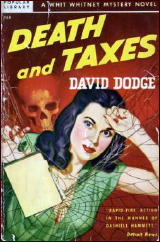
Shear the Black Sheep. Macmillan, hc, 1942. Popular Library 202, pb, 1949.
Bullets for the Bridegroom. Macmillan, hc, 1944. Popular Library 252, pb, 1950.
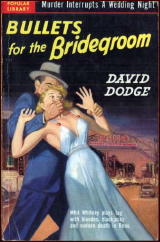
It Ain’t Hay. Simon & Schuster, hc, 1946. Dell 270, pb, mapback edition, 1949.
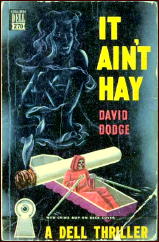
You can find much more detailed entries for each of these books at the David Dodge website, which includes a complete bibliography of all of his other books, both fiction and non-fiction. Not to mention his plays, his magazine stories, the articles he wrote and all of the radio, TV and movie adaptations of his work, the most well-known of which is To Catch a Thief, the Cary Grant and Grace Kelly film from 1955. Comprehensive is an understatement, and it’s definitely worth looking into, just to see a bibliography done right.
As for Whit Whitney, his home base is San Francisco, but in Shear the Black Sheep he is talked into taking a case in Los Angeles over the New Year’s Eve holiday weekend. Against his better judgment, he agrees to check into the activities of a client’s son, who seems to be spending too much of his father’s money in the business they’re in. They’re a wool brokerage firm — hence the title. The son has also left his wife and new-born baby. Is there another woman?
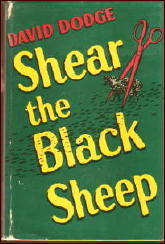
Assisting Whitney — or making her way down to LA on her own to spend the holiday with him, or as much of it as there is left after Whit’s investigative duties are over– is Kitty MacLeod, “the best-looking girl in San Francisco, and pretty clever as well,” as she’s described on page 12.
I’ve not read the first book in the series, and make no doubt about it, I will, but in that book (according the short recap on just about the same page) Whit’s former partner was murdered and at the time, Kitty was his wife.
It’s now six months later, and Whit and Kitty have become very close. Whit is beginning to worry that some of his colleagues are starting to talk. There had even been some talk at the time that Whit had had something to do with Kitty’s ex’s departure from life, and getting out of the jam at the time seems to be the gist of the story in Death and Taxes.
But that was then, and this is now. There is indeed a woman involved, as suspected — getting back to the case that Whit was hired to do — and the woman leads to a hotel room, and in the hotel room are … gamblers. A crooked card game, and the black sheep is getting sheared.
It is all sort of a light-hearted tale, in a way, but then a murder occurs, and a screwy case gets even screwier — in a hard-boiled kind of fashion. Let me quote from page 160. Whit is talking to his client, who speaks first:
“I won’t interfere with them. I’d cooperate with them except that they’ve told me to keep out of it. I want you to know how I feel, Mr. Clayton. You hired me to find out what Bob was doing with your money, and to stop it. I found out what was going on, but I thought the best way to stop it was to let these crooks get out on a limb, and then saw it off behind them. I thought I could protect your money and show Bob what was happening at the same time. I guessed wrong. I don’t know who killed […] or why he was killed, and I don’t think I’m responsible for his death, but I’m in a bad spot and I’d like to bail out of it by myself — for my own satisfaction. The police needn’t know what I’m doing. I don’t have to tell you that I don’t want to be paid for it, but if you haven’t any objection, I’ll try to find out who killed […] and get your money back.”
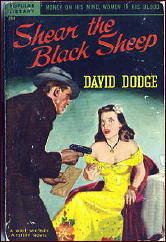
Here are a few lines from page 170, at which point things are not going so well:
Whit tried deduction.
Those were the days when mystery thrillers were also detective novels. After a long paragraph in which Whit tries out his best logic on the tangled threads of the plot, and who was where and when and why:
What’s interesting is that Kitty has more to do with solving the case than Whit does. Things happen rather quickly at the end, and if all of the loose ends are (or are not) all tied up, no one other than I seems to think it matters, as long as the killer is caught — who was not someone I suspected, or did I? I probably suspected everyone at one point or another.
I also wonder if what happens on the last page has anything to do with the title of Whit Whitney’s next adventure in crime-solving. Read it, I must. And I will.
[UPDATE] 06-24-09. That’s a promise to myself that I haven’t kept yet, alas, and re-reading this review (and looking at those paperback covers) gives me all the resolve I need to follow through. You can count on that and take it to the bank. Non-negotiable.
June 24th, 2009 at 6:25 pm
Simply put David Dodge is one of my favorites. Whether Whit Whitney, Al Colby, John Lincoln, or his stand alone suspense novels I’m perfectly willing to confess he has me. You can imagine how happy I was when Hard Case published his final book last year.
Catch the John Farrow film of Plunder in the Sun with Glenn Ford as Colby and a script by Jonathan Latimer. Nice little adventure film with a noirish touch.
Sad to say I haven’t read that Whitney novel you mention either, though I will when I find it. For my money Dodge is right up there with Charles Williams as one of the unsung masters.
And even if you have seen To Catch a Thief umpteen times check out the novel. Dodge has a few twists and changes of his own.
June 26th, 2009 at 1:12 am
I was actually disappointed with PLUNDER IN THE SUN. Partly with the story, which I don’t believe followed the book very much at all. My memory’s not good on this. I’d like to watch again to be sure, but my primary disappointment was because it wasn’t made in color.
If ever a black-and-white movie cried out for Technicolor, this movie, filmed on location in sunny Mexico, certainly did. Why go all the way to Mexico and not have color film in your cameras?
As for TO CATCH A THIEF, I have to admit that I’ve never read the book. It sounds as though I’d better!
June 26th, 2009 at 3:07 am
True Plunder mostly follows the outline of the book, but I liked it better than you, though why they went to all that trouble and shot in black and white I don’t know. But then when Farrow remade Five Came Back as Back From Eternity he did it in black and white. Again, why?
That said, Glenn Ford was good as Colby and almost anything with Diana Lynn and or Francis L. Sullivan is on my to see list. The recent DVD release has some nice extras.
Do read To Catch A Thief. Much of it will seem familiar from the film, but there are some major differences. Hard to see John Williams as the insurance investigator from the movie in the book. Dodge did some fine suspense novels usually with a setting on the Riviera.
The other two Colby books are The Long Escape and The Red Tassel. The two John Lincoln novels were Hooligan and Troubleshooter.
May 24th, 2010 at 5:11 pm
[…] Shear the Black Sheep (by Steve Lewis.) […]